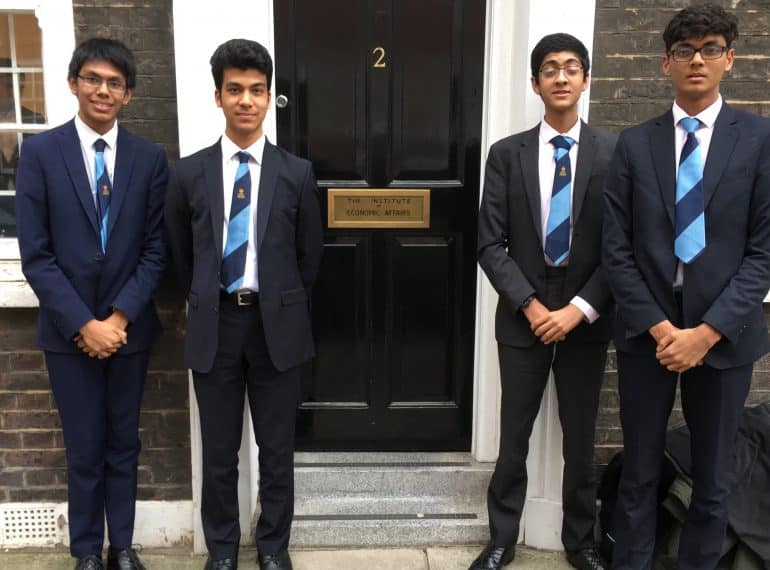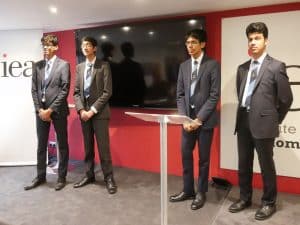
A QE team won praise from the judges for their multi-faceted presentation at the final of an Economics competition run by one of the country’s oldest thinktanks.
The team of four sixth-formers, including the co-presidents of QE’s Economics Society, were shortlisted among the final 12 teams for the final of the Budget Challenge run by the Institute of Economic Affairs (IEA).
Praising the boys on their contribution, QE’s Head of Economics Shamendra Uduwawala said: “Many of the finalists decided to concentrate on single policies whereas the QE boys decided to focus on multiple policies tackling different issues.”
Although the team were not among the eventual winners, Dr Stephen Davies, Head of Education at the IEA, praised their work as “very detailed and well worked-out”, saying: “I liked the presentation and [it was] very strong on an individual level.”
 The QE team chosen from Year 12 by Mr Uduwawala consisted of Economics Society co-presidents Rishi Shah and Hanif Gofur, together with Neel Shah and Rushil Shah. They were competing against schools including Harrow, Repton and North London Collegiate School.
The QE team chosen from Year 12 by Mr Uduwawala consisted of Economics Society co-presidents Rishi Shah and Hanif Gofur, together with Neel Shah and Rushil Shah. They were competing against schools including Harrow, Repton and North London Collegiate School.
For the challenge, each team had to prepare a budget for the UK in the coming financial year, with taxation and spending policy, as well as more briefly analysing the macroeconomic conditions and setting out a broad policy and strategy in response to these.
Rishi said: “We prepared a 5,000-word budget and constructed new policies to address Brexit uncertainty, the UK’s ageing population, the global growth slowdown and Industry 4.0 revolution. Our policies included; eNHS (a centralised online platform for the National Health Service), Project Unicorn (a technology start-up accelerator programme to scale-up new firms into market giants) and a reduction in stamp duty to name a few.”
The final, which was held at the IEA’s Westminster base, began with an introduction from Dr Davies, who recently delivered a lecture at QE on game theory. He discussed the history of the IEA, which was founded in 1955 based on a vision from economist Friedrich Hayek and now reports on economic affairs.
Then the competition began, with each of the 12 teams being asked to give a ten-minute presentation on their budget, followed by a ten-minute cross-examination by the judges. Soon after lunch – a ‘grand buffet’ – came the presentation for the QE team.
“We delivered our vision for the future of the economy and outlined our main policies,” said Rishi. “The judges then questioned our polices in detail and posed questions such as: ‘Why not scrap stamp duty instead of just reducing it?’ to which I answered that the long-term goal is to reduce stamp duty over time and eventually bring in an annual land value-based tax. They also questioned the potential ‘cyber security threat to the eNHS’, to which we replied that blockchain technology would be used to prevent data breaches.”
During lunch, the competitors listened to a talk from Rebecca Lowe, who is the Director of FREER – a major new initiative from the IEA promoting a freer economy and a freer society. She tackled the question ‘Is democracy worth it?’
She argued that democracy isn’t the realisation of an ideal society; instead it is more of a process. She then moved onto the relationship between democracy, the rule of law and the judicial system.
After all the presentations, there was a talk from Dr Kristian Niemietz, the IEA’s Head of Political Economy, who explained some of the key phrases frequently heard in the EU debate. He noted that the implications of Brexit will be on trade, immigration and regulation, as leaving the customs unions and the European single market would end the free movement of people. He used the analogy that the EU is not like being a Netflix subscriber, where either one is, or is not, subscribed. Instead, the EU is a great deal more complex, with many different parts and subsections, and one can be in each of them without being in all of them.
